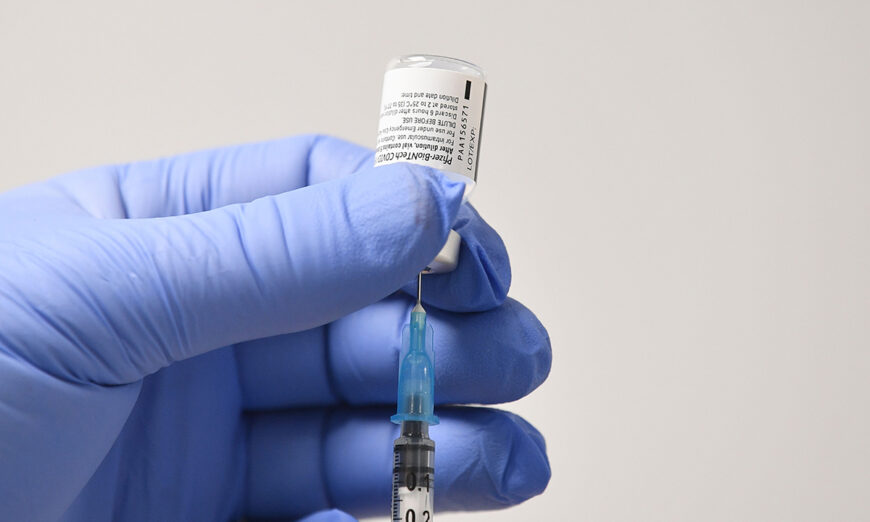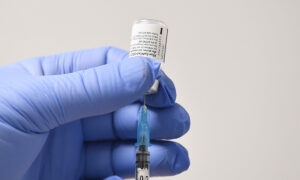COVID-19 Vaccines ‘May Trigger’ Rheumatic Inflammatory Diseases: Study
On average, patients developed rheumatic diseases 11 days after vaccine administration, according to the study.
A new review suggests that COVID vaccines “may trigger” rheumatic immune-mediated inflammatory diseases, including arthritis, vasculitis, lupus, and adult-onset Still’s disease.
On average, patients developed rheumatic diseases 11 days after vaccine administration, according to the study. Seventy-five (over 27 percent) of these patients experienced total disease remission, and about 50 percent improved following treatment. Eight were admitted to intensive care, and two died from their symptoms.
“The short time span between COVID-19 vaccine administration and the onset of R-IMIDs suggests the potential possibility of a cause-and-effect relationship,” the authors wrote.
Rheumatic immune-mediated inflammatory diseases (R-IMIDs) involve inflammation that manifests in the joints, tendons, muscles, and bones due to an unknown cause.
Over 80 percent of the patients developed symptoms after their first or second dose of the COVID-19 vaccine, and most were treated and improved with corticosteroids.
Almost 57 percent of the injured patients received the Pfizer vaccine, nearly a quarter received the AstraZeneca vaccine, and 12 percent of the rheumatic diseases manifested after the administration of the Moderna vaccine.
Reported Diseases
Rheumatic diseases may be less common than myocarditis, a known adverse event of COVID vaccination. A search on the Vaccine Adverse Event Reporting System (VAERS) found that over 3,000 cases of myocarditis have been reported after the COVID-19 vaccine, with over 2,300 cases of arthritis, over 370 cases of systemic lupus erythematosus, the most common type of lupus, and 280 cases of vasculitis. The following are rheumatic diseases that were included in this first-ever systematic review of new-onset R-MIDs after COVID vaccination.
Inflammation of Blood Vessels
Vasculitis was the most common rheumatic disease in the review, with 86 adverse events recorded. The more common vasculitis diseases affect the smaller blood vessels, causing red spots and lumps on the skin and possible organ damage. Medium and larger blood vessels can also be affected, causing tissue, muscle, and kidney damage.
One patient with inflammation in the larger blood vessels presented with fluid buildup in her lungs. Another developed inflammation in the arteries in his head and lost vision in his left eye due to reduced blood flow to his optical nerves.
Connective Tissue Diseases
Sixty-six cases of diseases affected the connective tissues. Diseases that fall under this category include lupus, an autoimmune disease affecting the skin, joints, and internal organs, and myositis and dermatomyositis, which manifest as muscle and tissue inflammation.
Two patients died of their conditions. One was a 44-year-old man who developed myositis, or muscle inflammation, and compartment syndrome in his limbs. Compartment syndrome is a painful and potentially fatal condition where pressure in muscles builds up. Another 62-year-old female died after developing diabetes and dermatomyositis, inflammation of both the skin and muscles, after getting the Pfizer vaccine.
Arthritis
Fifty-five patients developed arthritis after taking the vaccine, primarily manifesting in the knees, elbows, and ankles.
After treatment with steroids, most experienced some improvement in their symptoms, 12 went into remission, and two had persistent symptoms.
Adult-Onset Still’s Disease
Twenty-two cases of adult-onset Still’s disease were documented in the report. Symptoms of this rare disease include daily fever, arthritis in more than five joints, and salmon-pink rashes on the body. Six of these patients also developed cardiac problems, two of whom developed myocarditis and heart failure.
Five of the patients went into remission, while most experienced improvement in their conditions after being treated with steroids.
Other Diseases
Less common diseases include polymyalgia rheumatica, reported in 21 people. Symptoms of this disease include stiffness and inflammation in the shoulders, neck, and hips, and sarcoidosis, which occurs when inflamed tissues start to grow inside organs, causing tissue malfunction.
Molecular Mimicry Is the Leading Explanation
The authors noted the very short duration between vaccination and symptom onset, with 11 days being the average duration. This duration is similar to those found in other studies investigating myocarditis side effects after COVID-19 vaccines. The authors reasoned that the vaccine may have been a “trigger” for the rheumatoid diseases.
However, some of the patients might have been predisposed to rheumatic diseases, the authors reasoned. Additionally, some might have been predisposed to having a highly inflammatory response to mRNA vaccinations, leading to rheumatic symptoms like joint stiffness and inflammation.
Another possibility is that mRNA vaccines may trigger the formation of inflammasomes. Inflammasomes are clusters of proteins that signal inflammation and viral elimination. This can also cause immune cells to become hyperactive and damage self-tissues in an attempt to clear the vaccine.
This article has been archived for your research. The original version from Epoch Times can be found here.






